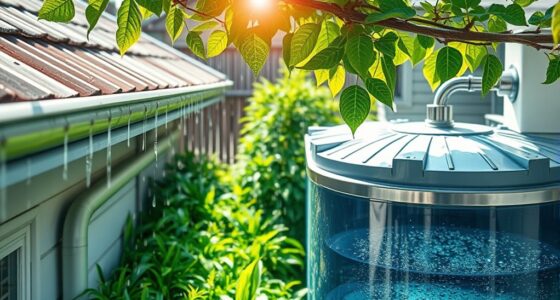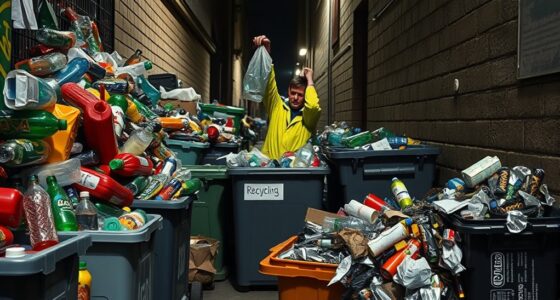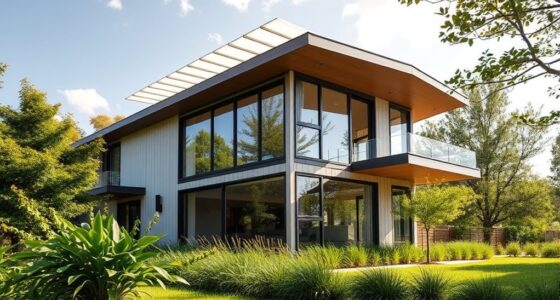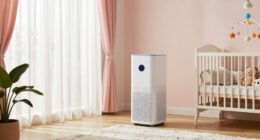To conserve water in your kitchen, install smart faucets with adjustable aerators that control flow and reduce wastage, and choose energy-efficient dishwashers that use less water per load. These upgrades allow you to cut down on unnecessary water use without sacrificing performance. Additionally, adopting habits like turning off taps while rinsing and filling the dishwasher fully further boosts savings. Keep exploring to discover simple tips and tools that make your kitchen more sustainable.
Key Takeaways
- Install water-efficient smart faucets with adjustable aerators to control flow and reduce water usage during kitchen tasks.
- Use high-efficiency dishwashers that operate with less water and are fully loaded before running.
- Avoid running taps continuously; use basins or fill sinks for rinsing and cleaning to minimize water waste.
- Regularly maintain fixtures and aerators to ensure optimal performance and water savings.
- Combine smart faucet use with rainwater harvesting for a sustainable, comprehensive water conservation approach.

Have you ever wondered how much water you waste daily in your kitchen? It’s easy to overlook how much unnecessary water slips down the drain, especially when you’re busy with cooking or cleaning. But small changes can make a big difference, and one effective way is by embracing rainwater harvesting alongside the use of faucet aerators. Rainwater harvesting allows you to collect and store rainwater for non-potable uses like rinsing dishes or watering plants, reducing your reliance on the tap and conserving municipal water supplies. Even if you don’t install a full rainwater harvesting system, capturing rainwater in barrels can supplement your water needs and lower your overall consumption.
Faucet aerators are another simple yet powerful tool for water conservation. These small attachments screw onto the end of your kitchen faucet and work by mixing air with water, which maintains good water pressure while considerably reducing flow. Using faucet aerators can cut your water use by up to 50%, helping you save gallons daily without sacrificing convenience. When you turn on the tap, you might not notice much difference in pressure, but the flow is much more controlled and efficient. Plus, many aerators are adjustable, so you can customize the flow to suit different tasks, like filling a pot or rinsing vegetables. Incorporating water-efficient fixtures into your kitchen can further enhance your conservation efforts and reduce utility bills.
In addition to installing faucet aerators, you can also adopt smarter habits. For instance, avoid leaving the tap running while washing dishes or scrubbing vegetables. Instead, fill a basin or sink with water for rinsing, which uses far less than continuous flow. Pairing this with a high-efficiency dishwasher can further reduce water waste. Modern dishwashers are designed to use less water than hand washing, especially when you run full loads. Make sure to choose appliances with water-saving features and follow manufacturer guidelines to maximize efficiency.
Frequently Asked Questions
How Do Smart Faucets Detect Water Leaks Automatically?
Smart faucets detect water leaks automatically using advanced sensor technology. These sensors monitor flow rates and detect irregularities, such as continuous flow when the tap should be off or sudden spikes. When leak detection occurs, the system alerts you via notifications or automatically shuts off the water supply to prevent wastage. You benefit from smarter water management, reducing waste and avoiding costly damage caused by unnoticed leaks.
Can Smart Dishwashers Be Integrated With Home Automation Systems?
Yes, smart dishwashers can be integrated with your smart home system. You can connect them through compatible platforms like Alexa, Google Home, or Apple HomeKit, allowing you to control and monitor your appliance remotely. This seamless appliance integration helps you manage water usage efficiently, set schedules, and receive alerts. By integrating your smart dishwasher, you optimize your water conservation efforts while enjoying added convenience and control within your smart home ecosystem.
What Is the Typical Lifespan of Water-Saving Kitchen Fixtures?
Fixture durability typically spans 10 to 15 years, depending on usage and maintenance. You’ll find that water-saving fixtures often last longer with proper care, but their efficiency can diminish over time. Planning for replacement costs helps you budget better, as these fixtures may need upgrading or repairs after a decade. Regularly inspecting and maintaining them prolongs their lifespan, ensuring your kitchen remains eco-friendly and efficient without unexpected expenses.
Are There Any Health Concerns With Using Filtered Water From Smart Faucets?
Using filtered water from smart faucets generally poses no health safety concerns, as long as the filters are maintained properly. These faucets improve water purity by removing contaminants, ensuring you get clean, safe drinking water. Regularly replacing filters guarantees peak performance and prevents bacterial buildup. As long as you follow manufacturer guidelines, filtered water from smart faucets supports your health by providing high-quality, pure water directly from your tap.
How Much Can I Realistically Save on Utility Bills Annually?
You can realistically save around $100 to $150 annually on utility bills by using smart faucets and dishwashers. These devices cut water usage markedly, leading to cost savings and environmental benefits. You’ll notice lower water and energy bills, plus you’re helping conserve resources. Over time, these savings add up, making your investment in smart kitchen technology worthwhile. Plus, you’re doing your part to protect the environment while saving money.
Conclusion
By choosing smart faucets and dishwashers, you can cut your water use by up to 30%. That’s like saving over 10,000 gallons of water each year—enough to fill a small backyard pond! Every time you turn on a high-efficiency faucet or run an eco-friendly dishwasher, you’re making a difference. So, take small steps in your kitchen to conserve water; it’s good for the planet and your wallet too.









